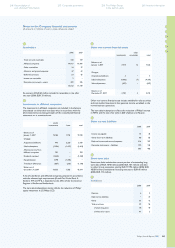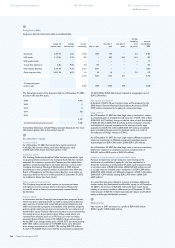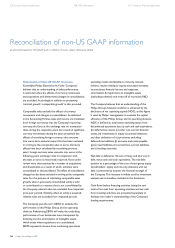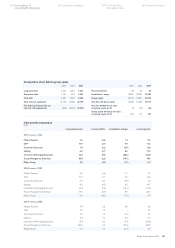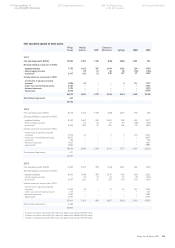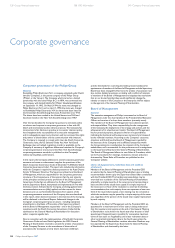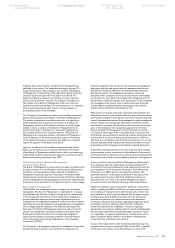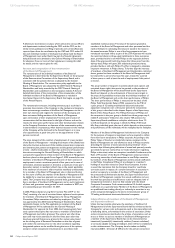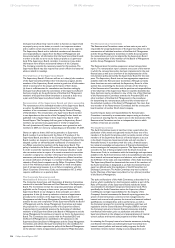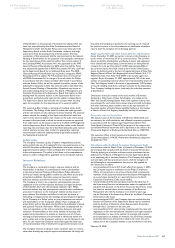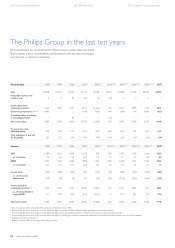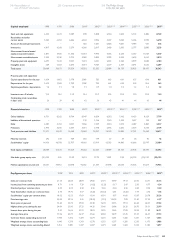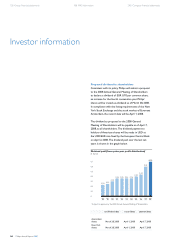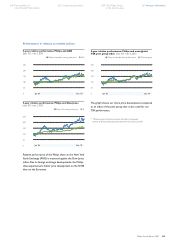Philips 2007 Annual Report Download - page 247
Download and view the complete annual report
Please find page 247 of the 2007 Philips annual report below. You can navigate through the pages in the report by either clicking on the pages listed below, or by using the keyword search tool below to find specific information within the annual report.
Philips Annual Report 2007 253
Supervisory Board
General
The Supervisory Board supervises the policies of the Board of
Management and the general course of affairs of Philips and advises
the executive management thereon. The Supervisory Board, in the
two-tier corporate structure under Dutch law, is a separate body that
is independent of the Board of Management. Its independent character
is also reected in the requirement that members of the Supervisory
Board can be neither a member of the Board of Management nor
an employee of the Company. The Supervisory Board considers all
its members to be independent under the applicable US Securities
and Exchange Commission standards and pursuant to the Dutch
Corporate Governance Code.
The Supervisory Board, acting in the interests of the Company and
the Group and taking into account the relevant interest of the Company’s
stakeholders, supervises and advises the Board of Management in
performing its management tasks and setting the direction of the
Group’s business, including (a) achievement of the Company’s objectives,
(b) corporate strategy and the risks inherent in the business activities,
(c) the structure and operation of the internal risk management and
control systems, (d) the nancial reporting process, and (e) compliance
with legislation and regulations. Major management decisions and the
Group’s strategy are discussed with and approved by the Supervisory
Board. In its report, the Supervisory Board describes its activities in
the nancial year, the number of committee meetings and the main
items discussed.
Rules of Procedure of the Supervisory Board
The Supervisory Board’s Rules of Procedure set forth its own
governance rules (including meetings, items to be discussed, resolutions,
appointment and re-election, committees, conicts of interests, trading
in securities, prole of the Supervisory Board). Its composition follows
the prole, which aims for an appropriate combination of knowledge
and experience among its members encompassing marketing,
technological, manufacturing, nancial, economic, social and legal aspects
of international business and government and public administration
in relation to the global and multi-product character of the Group’s
businesses. The Supervisory Board further aims to have available
appropriate experience within Philips by having one former Philips
executive as a member. In line with US and Dutch best practices, the
Chairman of the Supervisory Board should be independent under
the applicable US standards and pursuant to the Dutch Corporate
Governance Code; because this provision does not exclude a former
Philips executive from being Chairman of the Supervisory Board,
but only if he or she meets these standards, it is not fully in line
with recommendation III.4.2 of the Dutch Corporate Governance
Code. Under certain circumstances and in view of the position and
responsibilities of the Chairman of the Supervisory Board it could
be in the best interests of the Company that a member of the Board
of Management, who resigned such position more than ve years ago,
be Chairman of the Supervisory Board.
The Rules of Procedure of the Supervisory Board are published on
the Company’s website. They include the charters of its committees,
to which the plenary Supervisory Board, while retaining overall
responsibility, has assigned certain tasks: the Corporate Governance
and Nomination & Selection Committee, the Audit Committee
and the Remuneration Committee. A maximum of one member of
each committee need not be independent as dened by the Dutch
Corporate Governance Code. Each committee reports, and submits
its minutes for information, to the Supervisory Board.
The Supervisory Board is assisted by the General Secretary of the
Company. The General Secretary sees to it that correct procedures
are followed and that the Supervisory Board acts in accordance with
its statutory obligations and its obligations under the articles of
association. Furthermore the General Secretary assists the Chairman
of the Supervisory Board in the actual organization of the affairs of
the Supervisory Board (information, agenda, evaluation, introductory
program) and is the contact person for interested parties who want
to make concerns known to the Supervisory Board. The General
Secretary shall, either on the recommendation of the Supervisory
Board or otherwise, be appointed by the Board of Management and
may be dismissed by the Board of Management, after the approval
of the Supervisory Board has been obtained.
(Term of) Appointment, individual data and conicts
of interests
The Supervisory Board consists of at least three members (currently
eleven), including a Chairman, Vice-Chairman and Secretary. The so-called
Dutch ‘structure regime’ does not apply to the Company itself. Members
are currently elected by the General Meeting of Shareholders for xed
terms of four years, upon a binding recommendation from the Supervisory
Board. According to the Company’s articles of association, this binding
recommendation may be overruled by a resolution of the General
Meeting of Shareholders adopted by a simple majority of the votes
cast and representing at least one-third of the issued share capital. If a
simple majority of the votes cast is in favor of the resolution to overrule
the binding recommendation, but such majority does not represent at
least one-third of the issued share capital, a new meeting may be convened
at which the resolution may be passed by a simple majority of the votes
cast, regardless of the portion of the issued share capital represented
by such majority.
Members may be suspended by the Supervisory Board and the
General Meeting of Shareholders and dismissed by the latter. In
the event of inadequate performance, structural incompatibility of
interests, and in other instances in which resignation is deemed
necessary in the opinion of the Supervisory Board, the Supervisory
Board shall submit to the General Meeting of Shareholders a proposal
to dismiss the respective member of the Supervisory Board. There is
no age limit applicable, and members may be re-elected twice. The date
of expiration of the terms of Supervisory Board members is put on
the Company’s website. Individual data on the members of the
Supervisory Board are published in the Annual Report, and updated
on the Company’s website.
After their appointment, all members of the Supervisory Board shall
follow an introductory program, which covers general nancial and
legal affairs, nancial reporting by the Company, any specic aspects
that are unique to the Company and its business activities, and the
responsibilities of a Supervisory Board member. Any need for further
training or education of members will be reviewed annually, also on
the basis of an annual evaluation survey.
In accordance with policies adopted by the Supervisory Board,
no member of the Supervisory Board shall hold more than ve
supervisory board memberships of Dutch listed companies,the
chairmanship of a supervisory board counting as two regular memberships.
In compliance with the Dutch Corporate Governance Code, the
Company has formalized strict rules to avoid conicts of interests
between the Company and members of the Supervisory Board; all
information about a conict of interests situation is to be provided
to the Chairman of the Supervisory Board. No decisions to enter
into material transactions in which there are conicts of interest
with members of the Supervisory Board have occurred during
the nancial year 2007.
Meetings of the Supervisory Board
The Supervisory Board meets at least six times per year, including
a meeting on strategy. The Supervisory Board, on the advice of its
Audit Committee, also discusses, in any event at least once a year, the
risks of the business, and the result of the assessment by the Board
of Management of the structure and operation of the internal risk
management and control systems, as well as any signicant changes
thereto. The members of the Board of Management attend meetings
of the Supervisory Board except in matters such as the desired prole,
composition and competence of the Supervisory Board, the Board
of Management and the Group Management Committee, as well as
the remuneration and performance of individual members of the
Board of Management and the Group Management Committee and
the conclusions that must be drawn on the basis thereof. In addition
to these items, the Supervisory Board, being responsible for the quality
of its own performance, discusses, at least once a year on its own,
without the members of the Board of Management being present,
both its own functioning and that of the individual members, and the
conclusions that must be drawn on the basis thereof. The President/
CEO and other members of the Board of Management have regular
contacts with the Chairman and other members of the Supervisory
Board. The Board of Management is required to keep the Supervisory
Board informed of all facts and developments concerning Philips that
Group nancial statements Company nancial statements 250 Corporate governance246 Reconciliation of
non-US GAAP information 258 The Philips Group
in the last ten years 260
Investor information


